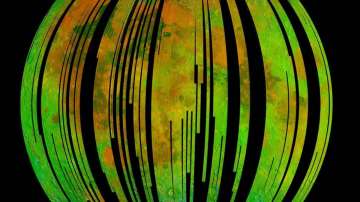The scientists recently discovered rust on the airless Moon. The detection of haematite on the lunar surface has surprised scientists. Haematite is an oxidised form of iron that, here on Earth, requires the presence of both air and water to form.
The Haematite was discovered in data collected by the Indian Space Research Organisation's Chandrayaan-1 orbiter. The Moon Mineralogy Mapper (M3) designed by NASA's Jet Propulsion Laboratory uses hyperspectral imaging to perform a granular spectroscopic analysis, giving a detailed breakdown of the Moon's surface mineral composition, as reported by NASA.
"It's very puzzling," said planetary scientist Shuai Li of the University of Hawaii at Manoa. "The Moon is a terrible environment for haematite to form in."
The haematite is also mostly found on the side of the Moon that is always facing Earth. That, according to the researchers, is really interesting.
"This discovery will reshape our knowledge about the Moon's polar regions," Li said. "Earth may have played an important role on the evolution of the Moon's surface."
The research has been published in Science Advances.
